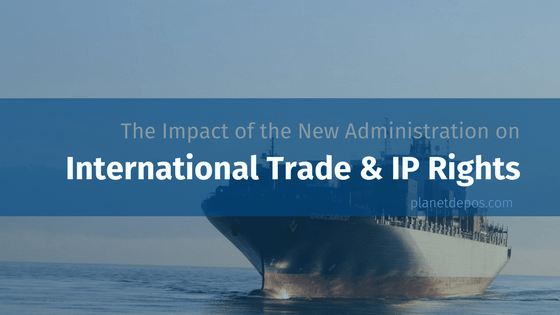By Katelin Myers
As we finished out the first month of the New Year, President Donald Trump completed his first few weeks in the Oval Office. Critics and supporters alike watched and analyzed every move the new Commander in Chief made, while simultaneously trying to predict its impact on the legal landscape.
One such area relates to the sphere of international commercial law. How will international trade agreements and theft of intellectual property across country borders be enforced? The debate continues to grow.
Though his thoughts on international trade and intellectual property and matters have not been explicitly stated, President Trump is known for his stance on “fair” trade agreements and the protection of American property, especially against overseas abuses. During the campaign trail, the President stated, “I am going to direct the Secretary of Commerce to identify every violation of trade agreements a foreign country is currently using to harm you, the American worker. . . [And] to instruct the U.S. trade representative to bring trade cases against China, both in this Country and at the WTO.”[1] The President has specifically called out certain countries for “cheating” on international trade on several occasions. This characterization seems to be partially in line with the United State International Trade Commission, which found in its 67th trade report that 13 of the 72 countries in trade agreements with the U.S. have violated various intellectual property rights, with another 24 landing on their cautious “watch list.”[2]
Though the President hasn’t proposed specific legislation or taken a clear stance related to intellectual property rights, his “personal and professional ties suggest a pro-patent stance”[3] implying that there “may be more willingness to take investment reciprocity into account (i.e., how China treats U.S. investors).”[4] Some sources also state that there may be an “increase use of trade remedies and enforcement mechanisms, including the AD/CVD laws, anti-circumvention proceedings, and safeguards”[5] and others make similar claims: “The President also has broad discretionary power to grant ‘safeguard’ relief in situations where the ITC finds that imports have been a substantial cause of serious injury to a domestic industry.”[6]
At this point in the Presidential transition, there is still room for speculation and analysis regarding the new administration’s impact on international trade and patent policy. However, with the potential for an increase in international trade and IP disputes, the need to take depositions abroad will likely rise as well.
For all of your international depositions needs, contact Planet Depos International Scheduling department at international@planetdepos.com or call 888-433-3767.
[1] TIME Staff. “Donald Trump’s Monessen, Penn. Speech on Trade.” (2016) Monessen, Pennsylvania. Time. Web. http://time.com/4386335/donald-trump-trade-speech-transcript/.
[2] United States International Trade Commission. (2015). The Year in Trade 2015: Operation of the Trade Agreements Program, 67th Report. Retrieved from https://www.usitc.gov/publications/332/pub4627.pdf
[3] Berkowitz, M., Colsher, P., Hannemann, M., Lucas, E, Makin, T., & Purcell, J. (2017, January 23). Predicting Patent Policy Under the Trump Administration. JD Supra Business Advisor. Retrieved from http://www.jdsupra.com/legalnews/predicting-patent-policy-under-the-47965/
[4] Bialos, J. & Herlach, M. (2016, December 5). The Trump Administration’s International Trade and Economic Policy: Available Options and Possible Implications for Industry. JD Supra Business Advisor. Retrieved from http://www.jdsupra.com/legalnews/the-trump-administration-s-26907/
[5] Clinton, W., Lincicome, S., Picone, B., Eglin, R., & Barrett, W. (2017, January 13). Outlook. White & Case. Retrieved from https://www.whitecase.com/publications/article/outlook
[6] Orava, S., Jones, S., Taylor, J., & Byers, B. (2016, November 14). How to Prepare for the Significant Changes to U.S. Trade Policy under President Donald Trump. King & Spalding. Retrieved from http://www.kslaw.com/library/publication/ca111416a.pdf

